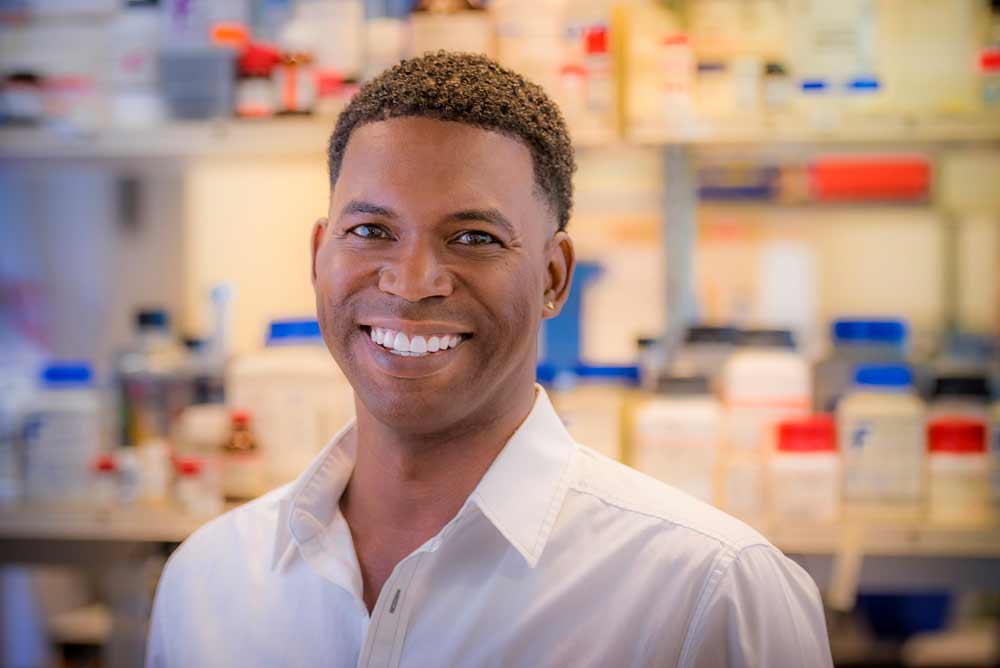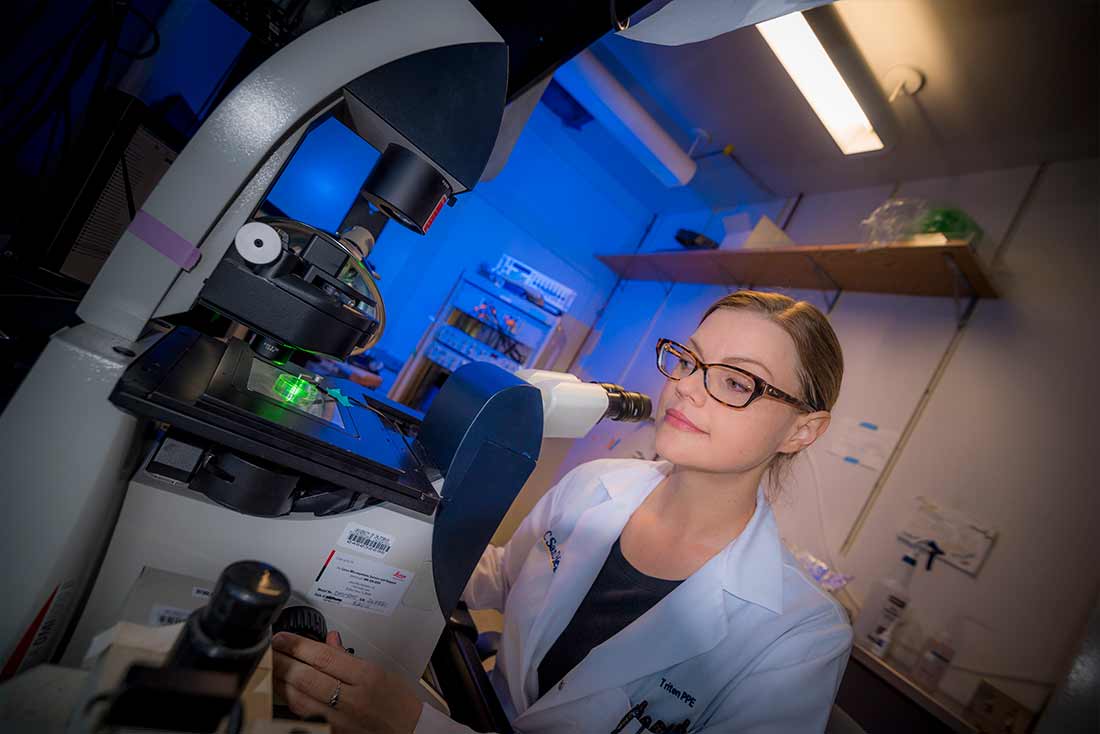A Mentor for Success
Biology professor strives to serve as example for students from diverse backgrounds
October 15, 2015
By Kim McDonald

Erik Jepsen
UC San Diego Publications
Gentry Patrick
Like many faculty members at UC San Diego, Gentry Patrick arrived on campus with sterling academic credentials: An undergraduate degree from the University of California, Berkeley, a Ph.D. from Harvard University and a postdoctoral fellowship from Caltech.
But his rapid success as an up-and-coming neurobiologist would not have been possible, he concedes, without the help of mentors who noticed his passion for research at a young age and then took the time to guide him in the right direction.
"I grew up in South Central Los Angeles, primarily Compton and Watts," said Patrick, an associate professor of biology and vice chair of the Neurobiology Section of the Division of Biological Sciences. "So for me, growing up in that neighborhood was not only interesting and special, but posed a lot of different challenges. One of those challenges was access to a quality education and what inspired me to be a scientist were mentors that I had along the way in high school and as an undergrad and eventually in graduate school-people who actually saw the potential that I might have and cared enough to foster that potential. So for me, mentors were very key to my success."
Recognizing Patrick's passion and talents for mentoring students and increasing diversity in science, Bill McGinnis, Dean of the Division of Biological Sciences, appointed Patrick this fall to a newly created position of Director of Mentorship and Diversity in the division.
"We decided to create the position to advise me and the chairs in the division on ways to increase the diversity of our faculty and students, and to appropriately mentor all biology students, particularly those from diverse and disadvantaged backgrounds," said McGinnis. "Gentry was the perfect person for this position because he's a brilliant teacher and researcher, and passionate about helping those from disadvantaged backgrounds."
In his 11 years on campus, Patrick has not only taught and mentored thousands of undergraduate and graduate students at UC San Diego-but looks for opportunities to mentor other youngsters growing up in underserved communities in San Diego who aren't exposed to scientists and don't realize that science can be a viable career option for them.
In August, he organized a trip for 70 middle school students-many of them from underrepresented backgrounds and communities-to UC San Diego's biology and biomedical science laboratories so they could see first-hand what working scientists do and understand how fundamental biological science research plays such a critical role to our future health. He also helps mentor students at the Elementary Institute of Science, a San Diego-based science enrichment program that nurtures students' intellectual curiosity by providing hands-on experiences, which brought the students to the campus last summer.
It was this type of practical laboratory experience that first ignited Patrick's love for science.
"What attracted me to biology was actually the research aspect," he recalled. "Sitting in a classroom, learning from a textbook while listening to a professor was not exactly what thrilled me. What I liked was the hands-on aspect of biology and research and the idea that I could create new knowledge, perhaps something that would be important and long-lasting-that would actually be beneficial to society-was quite appealing to me.
"The other thing about research that was appealing is that I was good at it. My hands were good. I might not have had the greatest grades, but I was good in science and I was good in doing the research. Learning to work with others in a collaborative effort was just extremely exciting and I had never had that type of experience growing up as a young kid. That's something that grabbed my attention early on and I became very passionate about it."

Erik Jepsen/UC San Diego Publications
Nick Spitzer, one of the senior faculty members in the division's Neurobiology Section who also directs the Kavli Institute for Brain and Mind, said Patrick's research on understanding the plasticity of the connections between neurons-which allows our brains to learn and form new memories-" leads the field." "He's done this work with a fleet of outstanding graduate students and undergraduates," Spitzer added. "His skillful mentorship has been recognized by his appointment as the associate director of UC San Diego's top ranked Neurosciences Graduate Program, where he's inspiring students from diverse backgrounds to follow in his footsteps."
As an African American who grew up in Compton and Watts, Patrick is more than mentor. He's a role model-living proof to young people from similar backgrounds and communities that they too can become rising stars in science if they work diligently enough and back those efforts up with a good education.
"Diversity and academic excellence are not divergent," he said. "Students need to see that people like themselves can have a career in science, so I strive to not only mentor students from these diverse backgrounds, but also to serve as an example for them.
"Some of the main barriers for students in under-served populations in gaining access to science and research as a career is really that first experience. To know whether or not they can be a scientist, they need to see individuals like themselves doing science. They need to meet scientists who look like them, who sound like them or come from the same regions of them. I think that those are really important things."
In his new position, Patrick plans to engage these students and others with the same passion he puts into his scientific research.
"Giving back to my community, specifically South Central Los Angeles as well as the local community here in San Diego, is very important to me," he added. "I think a lot of students don't realize the potential that they might have and what they can contribute to our community as scientists."